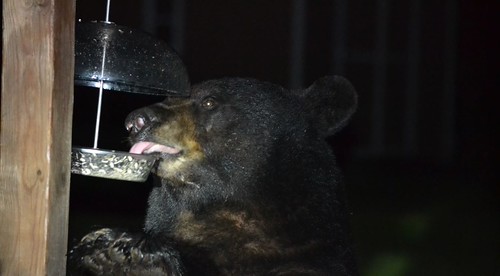Maryland’s Black Bears Emerging from Winter Dens
Bear County Residents and Visitors Urged to Keep Bears Wild

A black bear finds a food source. Maryland Department of Natural Resources photo
Spring is a time for new growth and increased wildlife activity across Maryland’s natural areas. In portions of the state, black bears have already emerged from winter dens, in search of easily accessible food sources. Relying on their powerful sense of smell, black bears are naturally attracted to items found on or near a residential dwelling such as birdseed, chicken feed, dog food, and even trash.
Homeowners who leave human-generated food sources out in the open may unintentionally draw bears to residential areas, and once a black bear finds an easy meal, they are likely to be repeat visitors. Young bears will quickly learn that the tastiest food comes from people, and exposure to these easy food sources will lead to a lifelong change in behavior that puts bears at risk.
The Maryland Department of Natural Resources advises that residents and visitors of Maryland’s bear country:
- Remove backyard bird feeders from April through November (birds have plenty of wild food sources during this time);
- Lock garbage in a bear-proof trash bin or store trash containers in a locked garage or shed until the morning of trash pickup; rinse out trash containers with ammonia to eliminate odors;
- Store pet food and bowls inside;
- Keep grills clean and clear of food residue and when not in use store them inside when possible.
“Keeping bears wild is a community effort that benefits both the bears and their human neighbors alike,” said Wildlife and Heritage Acting Director Karina Stonesifer. “Using care to avoid attracting bears now will help keep them wild and in the woods throughout the year.”
Bears are most common in Maryland’s four westernmost counties – Allegany, Frederick, Garrett, and Washington. However, they can be found anywhere in central and southern Maryland, particularly during spring when young male bears tend to wander into new areas looking for a chance to establish their own territory.
The Maryland Department of Natural Resources recently partnered with BearWise, a non-governmental organization dedicated to providing the public with sound, relevant, and easily interpretable information on black bears.
For more information on living with black bears and bear behavior, residents should visit the Maryland Department of Natural Resources black bear webpage or BearWise.

 1-888-373-7888
1-888-373-7888 233733
233733